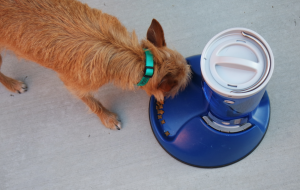 Another year has just gone by! I don’t know about you, but it feels like no matter how much I get accomplished, that to-do list just keeps on going. But before we take on a new year, let’s take a glance at the one we’re leaving behind. In our little corner of the world, this year Smart Animal Training Systems has focused on spreading the word about the Pet Tutor®, meeting trainers and dog owners across the country, gathering first impressions, sharing experiences and organizing the very first Pet Tech conference. We have been very blessed by the connections we have made during our travels. We have been energized by the stories we have harvested, and inspired by your expressions of love, devotion and care for animals of all kinds.
Another year has just gone by! I don’t know about you, but it feels like no matter how much I get accomplished, that to-do list just keeps on going. But before we take on a new year, let’s take a glance at the one we’re leaving behind. In our little corner of the world, this year Smart Animal Training Systems has focused on spreading the word about the Pet Tutor®, meeting trainers and dog owners across the country, gathering first impressions, sharing experiences and organizing the very first Pet Tech conference. We have been very blessed by the connections we have made during our travels. We have been energized by the stories we have harvested, and inspired by your expressions of love, devotion and care for animals of all kinds.
 On a personal note, I feel honored by such a growing readership. I have always believed that one of the most effective ways to make a difference in the welfare of those who cannot speak for themselves was through education. As science is booming with new findings on animal cognition and emotions, keeping up to date with the latest research has been both fascinating and exciting. Your support, comments and interest in the different topics that we covered during the year have substantiated the demand for validated information. And as Jacques Cousteau said: “What is a scientist after all? It is a curious man looking through a keyhole, the keyhole of nature, trying to know what’s going on.” And curious is what we are as we finally recognize that animals are capable of far more than we had ever imagined. Dogs can understand our hand gestures, learn through imitation, and have an exceptional ability to read and respond to human’s intentions and behaviors.
On a personal note, I feel honored by such a growing readership. I have always believed that one of the most effective ways to make a difference in the welfare of those who cannot speak for themselves was through education. As science is booming with new findings on animal cognition and emotions, keeping up to date with the latest research has been both fascinating and exciting. Your support, comments and interest in the different topics that we covered during the year have substantiated the demand for validated information. And as Jacques Cousteau said: “What is a scientist after all? It is a curious man looking through a keyhole, the keyhole of nature, trying to know what’s going on.” And curious is what we are as we finally recognize that animals are capable of far more than we had ever imagined. Dogs can understand our hand gestures, learn through imitation, and have an exceptional ability to read and respond to human’s intentions and behaviors.
In reviewing what I have learned and shared in my blogs, before we move on new discoveries, lets look back at the top 10 subjects that have caught your interest over the year 2014. Some are fairly basic while others are on the cutting edge of scientific discoveries.
- Reactivity and aggression in dogs: managing and treating: “While we’re quick to label many of the dog’s behaviors as aggressive, most dogs are simply reactive, in other words, they overreact to certain stimuli in the environment. Left untreated however, reactivity can lead to aggression.” This blog looked into the emotional reactions of dogs when on leash. When dogs lunge and bark, what can we do?
- Acts of punishment are stronger than rewards: “Studies on people and animals have shown that negative experiences have a faster and more lasting impact than positive ones. Why? Because one the brain’s function is to keep us alive and learning how to avoid painful or deadly situations is a matter of survival. As a result, using an aversive has a greater risk of impacting the animal’s emotional experience thus creating problems down the road.” This blog explains why our choice of resorting to either punishment or rewards in training is not simply a matter of efficiency.
 5 loving ways to pet a dog: “More studies today show that although dogs appreciate physical contact with us, we can often be rude in the way that we pet a dog, forcing our pets to put up with repeated discomfort. Even with the best of intentions, we can unknowingly trigger negative emotions in the dog.” In this post, we looked into some of the common mistakes that we can make when touching and petting a dog.
5 loving ways to pet a dog: “More studies today show that although dogs appreciate physical contact with us, we can often be rude in the way that we pet a dog, forcing our pets to put up with repeated discomfort. Even with the best of intentions, we can unknowingly trigger negative emotions in the dog.” In this post, we looked into some of the common mistakes that we can make when touching and petting a dog.
- Enrichment – 8 easy ways to increase your dog’s quality of life: “For most dogs, a typical day consists of lying around for 8-10 hours, waiting for their humans to come home. Even with the best of intentions, our busy lifestyles cannot provide our canine companions the level of activity and mental stimulation that they need.” This blog featured many different solutions to keep our pooches busier and happier.
- Social referencing: we influence how our dog sees the world: It’s quite obvious when living with a dog that they pick up on our emotions and can learn how to anticipate our reactions. Research is now proving that our emotions and behavior directly influences how they may feel and react in a new situation. This blog explained how we could use social referencing as a tool to positively influence our dog’s emotional response.
- The 10 best ways to get bit by a dog: In the U.S. alone, about 5 million people were bit last year with almost half of them being children. No matter the breed, the size, the age or the sex, all dogs have the potential to bite. This post highlighted some of the main reasons why dogs can put their teeth on us.
 Calming signals- Are they truly signals or calming? “The different behaviors, referred to as ‘calming signals’, are not specific to dogs, but are expressed in often very similar ways across the animal kingdom.” This blog looks into some of the very recent research on the subject and explores the nature and function of such behaviors.
Calming signals- Are they truly signals or calming? “The different behaviors, referred to as ‘calming signals’, are not specific to dogs, but are expressed in often very similar ways across the animal kingdom.” This blog looks into some of the very recent research on the subject and explores the nature and function of such behaviors.
- Is your body language helping or confusing your animal? “By combining principles of ethology along with those of behaviorism, we can learn how to pay close attention to how our own body language will influence the animal’s ability to respond.” This post brings forth the value of being mindful of our movements around animals as we can affect their emotions and intentions.
- Loose Leash Walking Fundamentals: “Teaching any dog to pay attention to us and keep slack in the leash is easy once we understand and apply some of the basic principles at play. Loose leash walking is however one the hardest skills to master, as it requires from us patience and consistency, two qualities that are easily influenced by our mood, our level of fatigue and our motivation of the moment.” In this blog, we explore the different techniques to effectively teach any dog to walk nicely on leash.
 10. When science and dog training come together – SPARCS 2014: “With the increase in scientific interest of canine behavior, we finally have access to validated data. Even better, science is made available to all dog lovers by the Society for the Promotion of Applied Research in Canine Science (SPARCS).” Broadcasted free of charge all over the world, this conference is one not to miss! This blog covers some of the most exciting topics of 2014.
10. When science and dog training come together – SPARCS 2014: “With the increase in scientific interest of canine behavior, we finally have access to validated data. Even better, science is made available to all dog lovers by the Society for the Promotion of Applied Research in Canine Science (SPARCS).” Broadcasted free of charge all over the world, this conference is one not to miss! This blog covers some of the most exciting topics of 2014.
Wishing you a fantastic year 2015, on behalf of the team of Smart Animal Training Systems, let me thank you once again, for following us, sharing our posts and expressing your comments. I’ll keep doing my best on finding interesting topics to share. Wes Anderson, the brain behind the Pet Tutor® is also coming up with really exciting new features for next year. Most of all, thank you for your ongoing efforts in making a difference in the lives of those around you.
Jennifer Cattet Ph.D.


[…] In reviewing what I have learned and shared in my blogs, before we move on new discoveries, lets look back at the top 10 subjects that have caught your interest over the year 2014. Some are fairly basic while others are on the cutting edge of scientific discoveries. […]